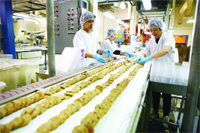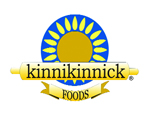
Harnessing the Web: How the Internet has contributed to Kinnikinnick’s success.
February 6, 2008
By Nordahl Flakstad
Selling books through the Internet – well, it might work. But baked goods – forget it!
 |
| Bigam was once an Internet commerce skeptic: “How can you ever put up a website and distribute perishable baking products to customers?” he once asked son Jay. |
Selling books through the Internet – well, it might work. But baked goods – forget it!
That pretty much summed up Jerry Bigam’s reaction in 1996, when his son Jay suggested turning to the Internet to market gluten-free products their Edmonton-based firm, Kinnikinnick Foods Inc., was producing from ingredients such as rice, tapioca, pea and potato starches.
“How can you ever put up a website and distribute perishable baking products to customers?” Jerry skeptically asked his son Jay, a musician who at the time was tinkering with the then-still-emerging concept of Internet music downloading.
In the mid-to-late 1990s, aside from pioneers such as Amazon.com, e-business was still mostly a novelty – something people tended to talk about rather than actually do.
But the more Jerry thought about it, the less half-baked Jay’s idea seemed. Jerry was a seasoned entrepreneur who had successfully picked up and run with other promising business propositions. That had been the case with Kinnikinnick, a venture he linked up with after his wife Lynne was diagnosed with Celiac Disease. She joined some two million other North Americans with gluten intolerances that cause difficulties in digesting most traditional bakery products.

Ted Wolff von Selzam began Kinnikinnick in 1991 as a modest business serving the gluten-free market in the Edmonton area. The Bigams eventually acquired Kinnikinnick, (which traces its name to an Algonquin name for a plant), when Ted retired from the business.
Neither Jerry nor Lynne had bakery backgrounds but they did know a bit about business. Jerry was somewhat of a serial (if not cereal) entrepreneur who earlier was one of the founders and president of Westcan Malting (now Rahr Malting Canada), which runs Western Canada’s largest barley-malting facility, near Red Deer, Alta. In Edmonton, Jerry was one of the founders and president of Ceapro, which uses oat extracts in veterinary and personal-care products. Lynne became active in Kinnikinnick after easing out of her law practice and working at the University of Alberta’s School of Business.
 |
| Jerry Bigam runs the Edmonton- based Kinnikinnick Foods, which offers specialty baked goods to customers across North America. |
Jay’s intuition about timing, the Internet and Kinnikinnick’s goods proved right. Soon, he had developed a website listing a Kinnikinnick selection of fresh no-preservatives products. That list now encompasses more than 100 products ranging from gluten-free bagels to pizza. It also includes a dozen varieties of bread, buns and specialty products such as KinniTOOS, which can easily be mistaken for Oreo cookies. Waffles are a recent addition.
Word about Kinnikinnick and what it offered quickly spread online in Canada and the U.S. within the celiac community and others seeking gluten-free products.
But as Jerry explains: “It’s nice to have a website but you’ve got to be able to supply product. You have to consider the cost of getting product to customers and within a reasonable time.”
Early on, Kinnikinnick relied on Canada Post and later the U.S. Postal Service to ship orders in modified atmosphere packaging that depended on nitrogen and carbon dioxide to keep product reasonably fresh until it reached its destination. But waiting eight to nine days for delivery proved too long for most customers.
Kinnikinnick began talking to several couriers, eventually teaming up with United Parcel Service in 1997. It allowed guaranteed overnight home delivery throughout North America. Kinnikinnick also charged a standard rate (still in effect) of $10 for shipping throughout North America for all orders regardless of size and location (the average order entails $70-to-$80-worth of product). The subsidized shipping was an ingredient of success and has placed Kinnikinnick among top five per cent UPS shipper by volume in Canada.
By late 1999, Internet orders amounted to about 30 per cent of sales. In the following years, percentage growth in sales grew by leaps and bounds before reaching more stable levels by 2003.
In 2005, Kinnikinnick acquired a 120,000-square-foot Edmonton baking plant formerly owned by cookie manufacturer Sunland Foods. Kinnikinnick also shifted its business model from being mainly retailer to becoming more of an industrial operation. Increased capacity allowed shipment of product by refrigerated trucks to major grocery chains and to 30 major distribution warehouses in North America that now supply a total of some 5,500 Canadian and U.S. health food and other retailers.
While wholesales deliveries now dwarf online sales, Jerry Bigam credits overall growth to the demand-pull caused by an Internet presence. Customers who discover Kinnikinnick online often asked businesses in their own backyard to stock the Edmonton firm’s product.
“There’s absolute growth in our Internet sales but the growth in our other sales far outstrips it,” Jerry Bigam explains.
“The most important part of our web business is its role as a marketing tool. The Kinnikinnick brand became known in all states and all provinces. We began to see a dramatic increase in our in-store business, beginning in 2002. That came strictly from customers putting pressure on retail and health food stores in the U.S. and Canada. That led more and more stores to carrying us and to them talking to their distributors into supply our products.”
Internet bake-to-order sales still mainly are baked and then shipped from Kinnikinnick’s older 30,000-square-foot retail and production facility, which includes a retail shop serving the Edmonton area.
Typically, production and shipment to meet online orders occurs Monday through Thursday to ensure all overnight deliveries reach their destinations by Friday and are not in transit over the weekend.
Internet sales now amount to 15 to 20 per cent of volumes and more typically involve specialized Kinnikinnick products not carried by the independent retailers. The website continues to be important in spreading the word about Kinnikinnick, and the health and nutritional value of its products.
Selling on the Internet brings challenges, including setting up secure payments services that customers can trust. Then there are the potential difficulties of operating across international borders in a world still coping with the jitters brought on by health and security alerts, whether for BSE, SARS or 9-11.
The U.S. Food and Drug Administration (FDA) responded to BSE and 9-11 by introducing “Prior Notice” that required American authorities to be notified before food imports reached the U.S. This could have proven disastrous for Kinnikinnick with its high volumes of individually addressed shipments. However, Jay Bigam drew on his computer skills to develop a program that provides a seamless electronic interface with the FDA and automatically submits an individual prior notice for every order headed for the U.S.
Other international markets could create their own challenges but that is not preventing Kinnikinnick from looking further a-field, with Britain as a prime candidate. Once again, the Internet can prove to be a way to spread the word and get Kinnikinnick product into customer’s hands and mouths.
For tips from Jerry Bigam on incorporating cyber sales into your business, go to www.bakersjournal.com .
Print this page
Leave a Reply